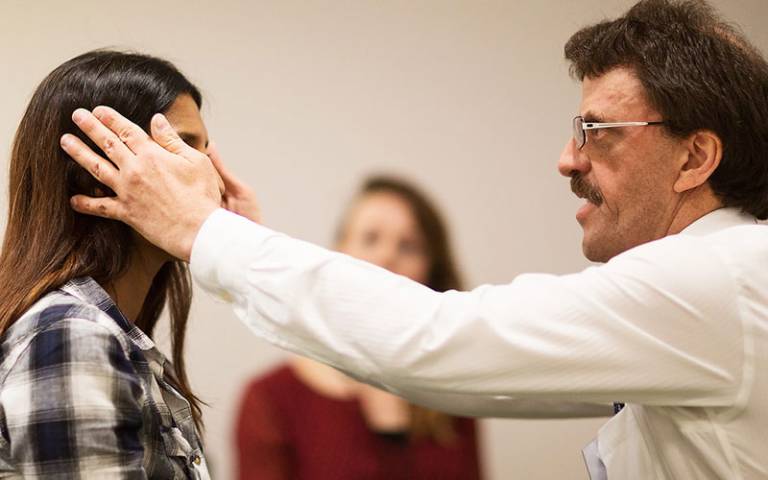Using TESTA to think differently about assessment
Paul Radomskij (UCL Ear Institute) explains the use of TESTA (Transforming the Experience of Students Through Assessment) to review the MSc Audiological Science.

22 August 2016
The process of using TESTA (Transforming the Experience of Students Through Assessment) was highlighted as best practice in a recent Internal Quality Review (IQR) report.
The MSc Audiological Science, a vocational course combining academic and practical learning, has been established for twenty years at UCL.
The eight taught modules within the MSc were consistent in their approach to assessment – all featured:
- an end-of-year final exam
- a mini test
- an essay of typically 2-3,000 words
- some modules supplement his with additional practicals throughout the year
Reviewing the assessment structure across the programme
Mr Radomskij took on the role of programme lead in 2008 and in 2013, worked with colleagues in the UCL Arena Centre for Research-based Education and the wider programme team to review the assessment structure of the course in its entirety.
“It was very valuable to have colleagues in Arena attend these sessions in an external capacity, to offer their teaching expertise to the wider team,” Mr Radomskij said.
They were introduced to TESTA (Transforming the Experience of Students Through Assessment), a process which encourages programme and module coordinators to think about assessment cohesively, in the same way students experience them – across the course of a year or more.
Using TESTA to avoid over-assessment: seeing it from a student perspective
Modularisation often results in an increase in assessment, so TESTA aims to present a picture of how students experience assessment across the programme so that the team can discuss patterns of over-assessment, bunching of assessment, varieties of assessment, amount and quality of feedback, timeliness of feedback etc.
In the first instance, the team mapped their assessments across the year.
They found:
- All eight final exams occurred around the same period of time, at the end of the year, supporting internal feedback that the volume of assessment was too high and students were feeling incredibly pressured.
- Students were feeling increasingly stressed with the number of formative and summative assessments over the year and the subsequent impact on timeliness and quality of feedback although they appreciated the value of consistent assessment.
- Some students felt the feedback was not as appropriate or effective as it could have been given the amount of assessment staff had to undertake.
Conversely, most staff thought the amount of assessment within their particular module was necessary, but through the TESTA process, they were encouraged to seek comparisons across UCL and more widely in across the Higher Education sector.
The results showed that the programme was considerably over-assessing.
Mr Radomskij comments,
“We wanted to use the process to encourage long-term thinking about assessment, particularly the type and quality, and to show that although it isn’t always possible to assess every learning outcome, we could rethink assessment to allow our students to show their knowledge.”
Changing assessment: making the approach more flexible
The TESTA process was therefore used to justify each individual assessment within the programme and subsequently the number was reduced or moved to different parts of the academic year.
The requirement that all modules must assess using the same methods was also dropped and part of negotiations included ensuring a broad mix of assessment types featured throughout the year. For example, one module no longer uses a final exam but consists of four periodic mini tests, whilst another focuses on practical assessments.
Although Mr Radomskij says the programme is still over-assessing in comparison to others of its type at UCL and the wider sector, there has been marked improvement in student scores and feedback of the learning experience.
Over the course of the two years, some modules have seen the number of assessments reduced by half and many have seen marks improve significantly. Students also highlight that their understanding of topics is better as they feel less pressured to deliver multiple assessments at one time of the year.
Mr Radomskij explains,
“As programme director, I co-ordinate and oversee the programme as well as co-ordinate my own speciality modules. However, the focus of the programme director role is to look at the number of assessments in the overall programme rather than direct on specific types. Formalising the role of programme lead in terms of assessment would make the process less difficult.”
The TESTA process has started the journey of improving the programme’s assessment structure by encouraging continuous review in to how marks are affected by spread over the year. The programme team will continue to review assessments using TESTA and by benchmarking with other universities and across UCL to bring students’ experience in line with other similar programmes.
 Close
Close

